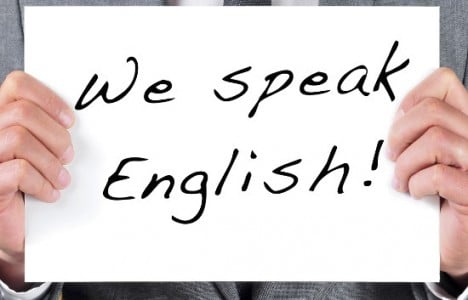Here's why the French struggle with English so much

Language teachers have united to share the reasons the French find English so difficult.
A new report from language school ABA English has tried to get to the bottom of why French people have such difficulties learning English, compared to other nationalities like Scandinavians or Germans.
Remember that a recent survey by Education First concluded that the French were the worst English speakers in Europe, and only just ahead of Turkey and Azerbaijan.
But according to ABA English school at least, the French honestly do struggle. In fact, the same school found in a January survey that only four percent of the country's population can actually speak "fluent English".
Fluency, as defined by ABA English, is being able to "easily converse" with someone in English.
It also found that 55 percent of respondents claimed to have an "intermediate level" of English, and a further 41 percent said they only have a very basic knowledge, or don't speak it at all.
While many point out that the fact the French still dub foreign TV series and films, reduces their access to English, ABA English, with the help of teachers, has looked at more specific grammar or language reasons to explain why the French struggle.
Here are what they claim to be the five biggest struggles of the French students of English.
1. Vocabulary
The main problem here, according to the teachers, is the words themselves. They point out that English is a Germanic language, rather than a Romance language like French. As a result, the roots of the words are different. This means that French people tend to turn to other Romance languages like Italian when they want to learn new languages, rather than try English, which involves a lot more memorization.
2. Grammar
Just like how us English speakers despair at French grammar, the French have the same problem with the English language. Particular sore points included getting confused between tenses, the difference between "to" and "at", using the verb "to be" when talking about age (rather than "to have" like in French), and getting confused between "when" and "as soon as".
 3. Irregular verbs
It's comforting to know that the French struggle with irregular verbs as much as many French learners do when it comes to French. And much like when learning the irregular verbs in French, there's not much advice the ABA teachers can give other than "be patient and learn them by heart".
3. Irregular verbs
It's comforting to know that the French struggle with irregular verbs as much as many French learners do when it comes to French. And much like when learning the irregular verbs in French, there's not much advice the ABA teachers can give other than "be patient and learn them by heart".
 4. Pronunciation
As cute as their French accent may be, if they can't pronounce words in English then people just won't understand them, say the teachers. One of the toughest challenges for the French, they said, was distinguishing between a long and a short vowel. And, especially in English, getting this wrong can change the whole meaning of a word (bet and beat, cap and cape, fit and fight, for example).
4. Pronunciation
As cute as their French accent may be, if they can't pronounce words in English then people just won't understand them, say the teachers. One of the toughest challenges for the French, they said, was distinguishing between a long and a short vowel. And, especially in English, getting this wrong can change the whole meaning of a word (bet and beat, cap and cape, fit and fight, for example).
 5. False friends
Yes, the French find these tough in English. Who'd have thought! If you think about it, many of them are the exact same false friends that we have while learning French (just seen from another perspective). The teachers warned that a "library" is a bibliothèque and a "bookshop" is a librairie, for example. But there's more to it than that.
They warned that straight translations can often leave people with basic mistakes, like saying "good appetite" for "bon appétit". "Instead, opt for an "enjoy your meal", or even just say "bon appétit" - your friends will find it chic, and you'll avoid making a language error.
5. False friends
Yes, the French find these tough in English. Who'd have thought! If you think about it, many of them are the exact same false friends that we have while learning French (just seen from another perspective). The teachers warned that a "library" is a bibliothèque and a "bookshop" is a librairie, for example. But there's more to it than that.
They warned that straight translations can often leave people with basic mistakes, like saying "good appetite" for "bon appétit". "Instead, opt for an "enjoy your meal", or even just say "bon appétit" - your friends will find it chic, and you'll avoid making a language error.
Comments
See Also
A new report from language school ABA English has tried to get to the bottom of why French people have such difficulties learning English, compared to other nationalities like Scandinavians or Germans.
Remember that a recent survey by Education First concluded that the French were the worst English speakers in Europe, and only just ahead of Turkey and Azerbaijan.
But according to ABA English school at least, the French honestly do struggle. In fact, the same school found in a January survey that only four percent of the country's population can actually speak "fluent English".
Fluency, as defined by ABA English, is being able to "easily converse" with someone in English.
It also found that 55 percent of respondents claimed to have an "intermediate level" of English, and a further 41 percent said they only have a very basic knowledge, or don't speak it at all.
While many point out that the fact the French still dub foreign TV series and films, reduces their access to English, ABA English, with the help of teachers, has looked at more specific grammar or language reasons to explain why the French struggle.
Here are what they claim to be the five biggest struggles of the French students of English.
1. Vocabulary
The main problem here, according to the teachers, is the words themselves. They point out that English is a Germanic language, rather than a Romance language like French. As a result, the roots of the words are different. This means that French people tend to turn to other Romance languages like Italian when they want to learn new languages, rather than try English, which involves a lot more memorization.
2. Grammar
Just like how us English speakers despair at French grammar, the French have the same problem with the English language. Particular sore points included getting confused between tenses, the difference between "to" and "at", using the verb "to be" when talking about age (rather than "to have" like in French), and getting confused between "when" and "as soon as".

3. Irregular verbs
It's comforting to know that the French struggle with irregular verbs as much as many French learners do when it comes to French. And much like when learning the irregular verbs in French, there's not much advice the ABA teachers can give other than "be patient and learn them by heart".

4. Pronunciation
As cute as their French accent may be, if they can't pronounce words in English then people just won't understand them, say the teachers. One of the toughest challenges for the French, they said, was distinguishing between a long and a short vowel. And, especially in English, getting this wrong can change the whole meaning of a word (bet and beat, cap and cape, fit and fight, for example).

5. False friends
Yes, the French find these tough in English. Who'd have thought! If you think about it, many of them are the exact same false friends that we have while learning French (just seen from another perspective). The teachers warned that a "library" is a bibliothèque and a "bookshop" is a librairie, for example. But there's more to it than that.
They warned that straight translations can often leave people with basic mistakes, like saying "good appetite" for "bon appétit". "Instead, opt for an "enjoy your meal", or even just say "bon appétit" - your friends will find it chic, and you'll avoid making a language error.
Join the conversation in our comments section below. Share your own views and experience and if you have a question or suggestion for our journalists then email us at [email protected].
Please keep comments civil, constructive and on topic – and make sure to read our terms of use before getting involved.
Please log in here to leave a comment.